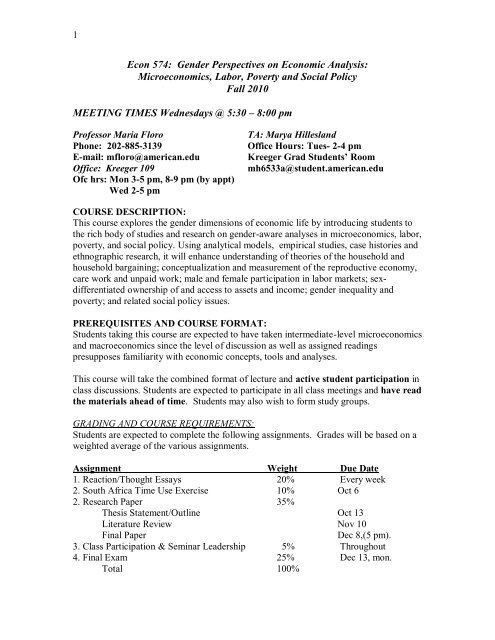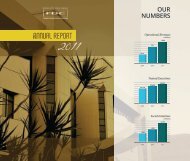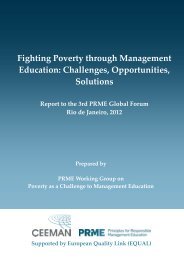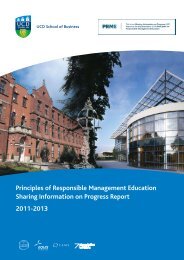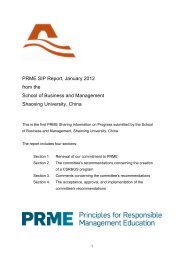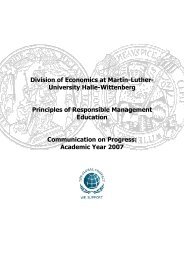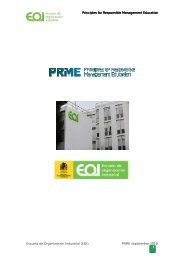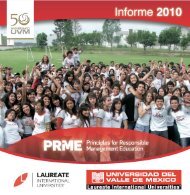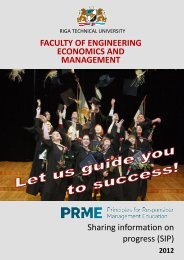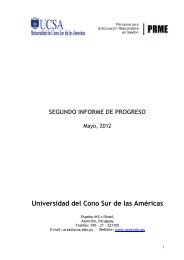Econ 574 - PRME
Econ 574 - PRME
Econ 574 - PRME
You also want an ePaper? Increase the reach of your titles
YUMPU automatically turns print PDFs into web optimized ePapers that Google loves.
1<br />
<strong>Econ</strong> <strong>574</strong>: Gender Perspectives on <strong>Econ</strong>omic Analysis:<br />
Microeconomics, Labor, Poverty and Social Policy<br />
Fall 2010<br />
MEETING TIMES Wednesdays @ 5:30 – 8:00 pm<br />
Professor Maria Floro<br />
Phone: 202-885-3139<br />
E-mail: mfloro@american.edu<br />
Office: Kreeger 109<br />
Ofc hrs: Mon 3-5 pm, 8-9 pm (by appt)<br />
Wed 2-5 pm<br />
TA: Marya Hillesland<br />
Office Hours: Tues- 2-4 pm<br />
Kreeger Grad Students’ Room<br />
mh6533a@student.american.edu<br />
COURSE DESCRIPTION:<br />
This course explores the gender dimensions of economic life by introducing students to<br />
the rich body of studies and research on gender-aware analyses in microeconomics, labor,<br />
poverty, and social policy. Using analytical models, empirical studies, case histories and<br />
ethnographic research, it will enhance understanding of theories of the household and<br />
household bargaining; conceptualization and measurement of the reproductive economy,<br />
care work and unpaid work; male and female participation in labor markets; sexdifferentiated<br />
ownership of and access to assets and income; gender inequality and<br />
poverty; and related social policy issues.<br />
PREREQUISITES AND COURSE FORMAT:<br />
Students taking this course are expected to have taken intermediate-level microeconomics<br />
and macroeconomics since the level of discussion as well as assigned readings<br />
presupposes familiarity with economic concepts, tools and analyses.<br />
This course will take the combined format of lecture and active student participation in<br />
class discussions. Students are expected to participate in all class meetings and have read<br />
the materials ahead of time. Students may also wish to form study groups.<br />
GRADING AND COURSE REQUIREMENTS:<br />
Students are expected to complete the following assignments. Grades will be based on a<br />
weighted average of the various assignments.<br />
Assignment Weight Due Date<br />
1. Reaction/Thought Essays 20% Every week<br />
2. South Africa Time Use Exercise 10% Oct 6<br />
2. Research Paper 35%<br />
Thesis Statement/Outline Oct 13<br />
Literature Review Nov 10<br />
Final Paper<br />
Dec 8,(5 pm).<br />
3. Class Participation & Seminar Leadership 5% Throughout<br />
4. Final Exam 25% Dec 13, mon.<br />
Total 100%
2<br />
_________________________________________________________________<br />
Students are required to receive a passing grade (70 or above) in all course requirements<br />
to receive a passing grade for the course. Grades are calculated as follows:<br />
A (90-100)<br />
B (80-89%)<br />
C (70-79%)<br />
D (60-69%)<br />
F (59% and below)<br />
Please note that each letter category includes both pluses and minuses.<br />
Late submissions and extensions will NOT be accepted/given unless accompanied by<br />
a written letter (stating medical or important emergency reason) and accompanying<br />
note from doctor.<br />
Reaction/Thought Essay (20%)<br />
You will be expected to write short three paragraph reaction/thought essays each week,<br />
posted on Blackboard, on the set of assigned readings. In this essay, you should state the<br />
most critical points (3-5) that you think are raised in the readings and discuss how each of<br />
the readings address these points. The essay should also give your own reflection on the<br />
issue or topic.<br />
South Africa Time Use Exercise (10%)<br />
An empirical assignment will be given to you in week 3. The purpose of the assignment<br />
is for students to gain/enhance their quantitative and critical thinking skills. You will be<br />
asked to analyze a time use data set drawn from the national South Africa sample. You<br />
will be asked to analyze the data provided (in the Blackboard) by answering some<br />
questions that will be given.<br />
The data analysis will require some knowledge of econometrics and STATA. Those with<br />
weak background on STATA should attend the tutorial session on STATA. Tutorial<br />
sessions will be given on the week of Sept 7-10.<br />
Research Paper (35%)<br />
The research paper should be your own in-depth exploration of any topic covered in this<br />
course with a maximum length of 20 pages (text). It should be an in-depth exploration of<br />
any topic covered by any of the themes in the course<br />
The research paper involves three steps in order to facilitate feedback and comments:<br />
1) Thesis statement and outline (with a list of references)<br />
2) Literature review and<br />
3) Final research paper that includes a revised literature review and any one of the<br />
following:<br />
‣ modifying an economic model (trade, macroeconomics, household, credit, etc) by<br />
incorporating gender,
3<br />
‣ exploration or development of feminist methodology in studying a particular<br />
issue and applying it through interviews, qualitative and quantitative surveys,<br />
participant observation, etc.<br />
‣ empirical analysis of any topic covered in the course using time series or crosssection<br />
statistics<br />
‣ critical analysis of a gender-aware, innovative project or development initiative.<br />
Below is a brief description of each component of the research paper.<br />
Thesis and Outline of paper (with list of references)<br />
The thesis statement should include a clear statement of the ISSUE that you would like to<br />
address. State clearly the importance of or the rationale for conducting such a study.<br />
Your outline MUST include a list of possible references which serve as your starting<br />
point for the literature review.<br />
If you plan to write an empirical paper, be sure to check first on the availability of and<br />
accessibility of the data. Then familiarize yourself with the sample design, the variables<br />
and other characteristics of the data so you can develop a feasible and doable thesis<br />
statement.<br />
If you plan to analyze an innovative, gender-aware project or initiative, be sure to check<br />
first on the availability of detailed information that would be helpful to your critical<br />
analysis. For the thesis statement and outline requirement, state the issue or problem that<br />
the initiative addresses, who are the intended beneficiaries, and a short description of the<br />
project. Your references should include the sources of project information as well as<br />
relevant readings on the issue or problem being addressed that would be helpful in your<br />
assessment.<br />
DUE DATE: October 13 (in class)<br />
Literature review paper (with references)<br />
The review of the existing literature should cover: a) pertinent studies that address the<br />
issue either conceptually/ theoretically or empirically, and/or b) studies on similar<br />
projects that have been implemented in the past to address directly the problem or that are<br />
currently being implemented in other countries.<br />
The reference sections of the books and assigned articles, as well as the syllabus section<br />
on supplementary material, are good starting points. The use of AU library databases,<br />
JSTOR, and the journal Feminist <strong>Econ</strong>omics provide additional materials on the subject<br />
but you need to be selective and must cite fully these sources. [See tips for writing a good<br />
review paper in Blackboard]<br />
The literature review must be typed, double-spaced and a maximum length of 12 pages.<br />
DUE DATE: November 10 (in class)
4<br />
Final Paper<br />
The final research paper involves full development of your thesis statement, a revised<br />
literature review, and one of the additional features noted above.<br />
The last part of the paper must present your own perspective and analysis of the issue (for<br />
PhD students, this involves using primary (household or individual level) or secondary<br />
data/info). You need to compare and contrast your results with those in existing studies<br />
and provide a brief explanation.<br />
For those undertaking a critical analysis of an innovative project or initiative, be sure to:<br />
a) state clearly your assessment criteria, b) the information used in making the evaluation;<br />
whenever possible, provide the detailed cost and benefit estimates information on the<br />
project initiative, and c) critically evaluate the project from a gender-aware<br />
perspective.<br />
The final paper must be typed, double-spaced and should have a maximum length of 20<br />
pages. Tables and appendices can be extra pages. DUE DATE: Dec 8, 5pm wed (no<br />
exceptions).<br />
The final grade on the Research Paper will be calculated as the weighted average of four<br />
categories:<br />
1. Command of the arguments, findings, and significance of the topic (35%).<br />
2. Sophistication and originality of the critical analysis, conceptual/theoretical<br />
framework or empirical analysis (35 %).<br />
3. Coherence and skill displayed in paper organization (logical format, footnotes,<br />
citations, references) and writing (30%).<br />
Class Participation and Paper Presentation (10%)<br />
Students are expected to read the assigned reading material, attend classes, do<br />
assignments, and come prepared for discussion.<br />
In Weeks 13 and 14 of the semester, each student will be expected to make a 10-15<br />
minute presentation of their own research paper (a work-in progress of the final paper) in<br />
class. I will give the schedule of the presentations by October 27. In addition, each<br />
student will serve as a discussant to another paper that will be presented in class (3-5<br />
minute presentation).<br />
Seminar Leadership (required for doctoral students): Starting September 15 (week 4),<br />
doctoral students will be asked to lead the discussion on the empirical readings in the<br />
second part of the class meeting. Each team (pair of 2) will be expected to make a 20-<br />
minute presentation on one (1) selected reading and to lead the class in critically<br />
discussing the article (15 minutes).
5<br />
Final Exam (25%)<br />
The final exam will cover all the topics discussed in the course. The date for the final<br />
exam is December 13, Monday 5:30-8:00 pm.<br />
ACADEMIC INTEGRITY:<br />
I take plagiarism and academic dishonesty very seriously, and I am required to report<br />
cases to the Dean of the College of Arts and Sciences, whose policy is to fail students for<br />
the course. Please read the university's Academic Integrity Code closely, and be sure to<br />
ask me if you have any questions. The code is available online at<br />
http://www.american.edu/academics/integrity/index.htm.<br />
In writing papers, you must properly cite all sources (1) directly quoted, (2) paraphrased,<br />
or (3) consulted in any fashion. Sources include all printed material as well as the<br />
Internet. Proper citation means using a standard citation format: MLA, APA, or Chicago.<br />
It is also considered plagiarism if you merely rework source material, placing an author's<br />
thoughts in other words without contributing your own ideas. For that reason, you must<br />
include some kind of source note whenever drawing on someone else's interpretation. A<br />
source note can be a sentence or more in your paper, or it can be a footnote. A source<br />
note should clarify the extent to which your interpretation is indebted to your source,<br />
explaining both (1) what you use and (2) where you depart or differ from the source.<br />
It is also considered plagiarism to submit drafts, response papers, and other informal<br />
assignments without properly citing sources and acknowledging intellectual debts.<br />
Failure for the course is the typical sanction in such cases.<br />
You must receive prior permission from me if you want to submit a paper or part of a<br />
paper that you have written for a previous class.<br />
READINGS:<br />
N.B. The reading assignments may be subject to change. I will notify you ahead of time<br />
through the Blackboard e-mail system if there are any changes. Please check Blackboard<br />
each week for updates.<br />
Required:<br />
Beneria, L. (2003). Gender, Development and Globalization. Routledge Books, New<br />
York and London.<br />
Recommended:<br />
Ferber, M. and J. Nelson (eds) (1993). Beyond <strong>Econ</strong>omic Man: Feminist Theory and<br />
<strong>Econ</strong>omics, University of Chicago Press, Chicago.<br />
Petersen, J. and M. Lewis (eds) (1999). The Elgar Companion to Feminist <strong>Econ</strong>omics,<br />
Edward Elgar, Cheltanham, UK. [This is a handy reference book.]
6<br />
Nancy Folbre (2008). Valuing Children, Harvard University Press<br />
The course will rely heavily on articles in Feminist <strong>Econ</strong>omics and other journals,<br />
working papers, and e-publications that are either available in the AU library journal<br />
database or posted in the course documents section of Blackboard [BB].<br />
COURSE SCHEDULE AND ASSIGNED READINGS<br />
Week 1- August 25<br />
Course Overview and Introduction to Gender Perspectives in <strong>Econ</strong>omic Analysis<br />
*Beneria, L. (2003) „The Study of Women and Gender in <strong>Econ</strong>omics‟, in Beneria, L.<br />
(ed.) Gender, Development and Globalization, London: Routledge, Ch. 2: 31-62.<br />
[BENERIA]<br />
*Ferber, M. and Nelson, J. (eds) (1993) Beyond <strong>Econ</strong>omic Man, Chicago: University of<br />
Chicago Press. Introduction and Chapter 1.[FERBER AND NELSON]<br />
*Strassman, Diana (1999) “Feminist <strong>Econ</strong>omics” in The Elgar Companion to Feminist<br />
<strong>Econ</strong>omics, Cheltenham, UK: Edward Elgar [PETERSON AND LEWIS]<br />
*Barker, Drucilla (1999) “Gender” in The Elgar Companion to Feminist <strong>Econ</strong>omics, Cheltenham,<br />
UK: Edward Elgar [PETERSON AND LEWIS]<br />
*Meagher, G. and Nelson, J. (2004) „Survey Article: Feminism in the Dismal Science‟,<br />
The Journal of Political Philosophy, 12(1): 102-26. [BB]<br />
Supplementary Readings: (These give a good overview of the political economy of<br />
gender in the last decade):<br />
United Nations Research Institute for Social Development. (2005) Gender Equality:<br />
Striving for Justice in an Unequal World. Geneva: UNRISD. Introduction and Chapter 1<br />
[BB]<br />
Grown, C., Gupta, G. and A. Kes (2005) Taking Action: Achieving Gender Equality and<br />
Empowering women. London: Earthscan. ([BB])<br />
Week 2-5: Gender Perspectives in Microeconomics<br />
Week 2- September 1: Understanding Mainstream <strong>Econ</strong>omic Model of Household<br />
*Becker, G. (1991) A Treatise on the Family (enlarged edition), Cambridge: Cambridge<br />
University Press. Chapters 1, 2, 8. [BB]<br />
*Pollak, R. (2003) „Gary Becker‟s Contribution to Family and Household <strong>Econ</strong>omics,‟
7<br />
Review of <strong>Econ</strong>omics of the Household, 1(1-2), 111-41. [Handout]<br />
Week 3- September 8: Feminist Critiques of Becker and Introduction to Household<br />
Bargaining Models<br />
*England, P. (1993) „Separative and Soluble Selves: Dichotomous Thinking in<br />
<strong>Econ</strong>omics‟, in Ferber, M. and Nelson, J. (eds) (1993) Beyond <strong>Econ</strong>omic Man: Feminist<br />
Theory and <strong>Econ</strong>omics, Chicago: University of Chicago Press, Ch 1. 33-60. [FERBER<br />
AND NELSON]<br />
*Pollak, Robert (2003) “Gary Becker‟s Contributions to Family and Household<br />
<strong>Econ</strong>omics”, Review of <strong>Econ</strong>omics of the Household, Vol. 1, pp. 111-141.<br />
[WEBLINK: http://www.nber.org/papers/w9232.pdf?new_window=1]<br />
*Folbre, N. (1986) „Hearts and Spades: Paradigms of Household <strong>Econ</strong>omics‟, World<br />
Development, 14(2): 245-55. [BB]<br />
*Frances Wooley (1996). “Getting the Better of Becker” Feminist <strong>Econ</strong>omics, Vol. 2 (1) pp. 114-<br />
120. [BB]<br />
*Alderman, H., Chiappori, P-A, Haddad, L., Hoddinott, J. and Kanbur, R. (1995)<br />
„Unitary Versus Collective Models of the Household: Time to Shift the Burden of Proof‟,<br />
World Bank Policy Research Working Paper Series No. 1217, Washington, D.C.: World<br />
Bank. [BB]<br />
Supplementary Readings:<br />
Bergmann, B. (1995) „Becker‟s Theory of the Family: Preposterous Conclusions‟,<br />
Feminist <strong>Econ</strong>omics, 1(1): 141-50.<br />
Udry, C. (1996). “Gender, Agricultural Production and the Theory of the Household,”<br />
Journal of Political <strong>Econ</strong>omy 104(5):1010-46.<br />
Bergstrom, T. (1996), “<strong>Econ</strong>omics in a Family Way,” Journal of <strong>Econ</strong>omic Literature,<br />
Vol. 34, December, pp. 1093-1034.<br />
*Ferber, Marianne (2003) “A Feminist Critique of the Neoclassical Theory of the Family” in<br />
Karine S. Moe (ed.) (2003), Women, Family and Work: Writings on the <strong>Econ</strong>omics of Gender,<br />
MA: Blackwell.<br />
Weeks 4-5- September 15, 22: Household Bargaining Frameworks and Models: Some<br />
Examples [Seminar Leadership Presentation]<br />
*Sen, A. (1990), “Gender and Cooperative Conflict” in Irene Tinker (ed), Persistent<br />
Inequalities, Oxford University Press, Oxford pp. 123-149. [BB]
8<br />
*Carter, M. and Katz, E. (1998), “Separate Spheres and the Conjugal Contract:<br />
Understanding the Impact of Gender Biased Development” in Hoddinott, John, Harold<br />
Alderman and Lawrence Haddad (eds.) (1998) Intrahousehold Resource Allocation in<br />
Developing Countries: Methods, Models and Policy. Johns Hopkins University Press.<br />
[BB]<br />
*Lundberg, S. and Pollak, R. (1993) „Separate Spheres Bargaining and the Marriage<br />
Market‟, Journal of Political <strong>Econ</strong>omy, 101(6): 988-1010. [BB]<br />
*Braunstein, E. and Folbre, N. (2001) „To Honor and Obey: Efficiency, Inequality and<br />
Patriarchal Property Rights,‟ Feminist <strong>Econ</strong>omics, 7(1): 25-44, March. [BB]<br />
Supplementary Readings:<br />
Agarwal, B. (1997) „Bargaining and Gender Relations: Within and Beyond the<br />
Household,‟ Feminist <strong>Econ</strong>omics, 3(1): 1-51. [Good background Reading.][BB]<br />
Pollak, R. (1994) „For Better or Worse, the Roles of Power in Models of Distribution<br />
within Marriage,‟ American <strong>Econ</strong>omic Review, 84(2): 148-52. [BB]<br />
Doss, C. (1996). Testing among Models of Intrahousehold Resource Allocation, World<br />
Development, 24 (10): 1597-1609.<br />
NOTE: Empirical Assignment made available in BB.<br />
Weeks 6-7: Time Use, Unpaid Work, and Care<br />
Week 6- September 29: Unpaid Work, Care, and Time Use Patterns: Conceptual Issues<br />
and Analysis<br />
*Folbre (2008) Valuing Children, Chaps 1-2. 4 [FOLBRE]<br />
*Himmelweit, S. (1999) „Caring Labor,‟ Annals of the American Academy of Political<br />
and Social Science, 561 (1): 27-38.[BB]<br />
*Shahra Razavi (2007) The Political and Social <strong>Econ</strong>omy of Care in a Development<br />
Context”, Gender and Development Paper Programme No. 3, UNRISD. [BB]<br />
*Beneria, L. (2003). Gender, Development and Globalization. Routledge Books, New<br />
York and London. Chapter 5, pp. 133-160.[BENERIA]<br />
*Phipps, S., Burton, P. and Osberg, L. (2001) „Time as a Source of Inequality Within<br />
Marriage: Are Husbands More Satisfied with Time for Themselves Than Wives?‟<br />
Feminist <strong>Econ</strong>omics, 7(2): 1-21. [BB].
9<br />
Supplementary Readings:<br />
Craig, L. (2005) „Where Do They Find the Time? An Analysis of How Parents Shift and<br />
Squeeze Their Time around Work and Child Care‟, Paper presented at a Conference on<br />
Time Use and <strong>Econ</strong>omic Well-Being, Annandale-on-Hudson, The Levy <strong>Econ</strong>omics<br />
Institute, October 2005.<br />
Budlender, Debbie (2008) “The Statistical Evidence on Care and Non-Care Work across Six<br />
Countries,” Gender and Development Paper No. 4, Geneva: UNRISD. [WEBLINK:<br />
http://www.unrisd.org/unrisd/website/document.nsf/ab82a6805797760f80256b4f005da1ab/f9fec4<br />
ea774573e7c1257560003a96b2/$FILE/BudlenderREV.pdf<br />
Badgett, L. and Folbre, N. (1999) „Assigning Care: Gender Norms and <strong>Econ</strong>omic<br />
Outcomes,‟ International Labour Review, 138(3): 311-26.<br />
Folbre, N. and Weisskopf, T. (1998) „Did Father Know Best? Families, Markets and the<br />
Supply of Caring Labor‟, in Ben-Ner, A. and Putterman, L. (eds) (1998) <strong>Econ</strong>omics,<br />
Values and Organization, Cambridge: Cambridge University Press, 171-205.<br />
Week 7- October 6: Measurement and Valuation of Unpaid Work, Time Use Data, and<br />
Policy Issues [Seminar Leadership 3]<br />
*Folbre (2008) Valuing Children, Chaps 6-7.<br />
* Indira Hirway (2009), “Time Use Surveys in Developing Countries: An Assessment”,<br />
Working Paper, Center for Development Alternatives, India.[BB]<br />
* Valeria Esquivel, Debbie Budlender, Nancy Folbre, and Indira Hirway (2008)<br />
“Explorations: Time-use Surveys in the South”, Feminist <strong>Econ</strong>omics, 14: 3, 107 -152<br />
*Michael Bittman (1999). “Parenthood Without Penalty: Time Use and Public Policy in<br />
Australia and Finland, Feminist <strong>Econ</strong>omics. [BB]<br />
* Kelly Hallman, Agnes Quisumbing,Marie ruel, Bene´dicte de la Brie` re<br />
”Mothers‟ Work and Child Care: Findings from the Urban Slums of Guatemala City”<br />
<strong>Econ</strong>omic Development and Cultural Change, pp. 855-885.[BB]<br />
Supplementary Materials:<br />
Juster, F. and F. Stafford (1991). “The Allocation of Time: Empirical Findings,<br />
Behavioral Models and Problems of Measurement, Journal of <strong>Econ</strong>omic Literature, June,<br />
pp. 471-486 and 504-514 [BB]
10<br />
Floro, M. and Miles, M. (2003), “Time Use, Work and Overlapping Activities,”<br />
Cambridge Journal of <strong>Econ</strong>omics, 27(6). [BB]<br />
Joshi, H. (1990) „The Cash Opportunity Costs of Childbearing: An Approach to<br />
Estimation using British Data,‟ Population Studies 44(1):41-60.<br />
Ironmonger, D. (1996) „Counting Outputs, Capital Inputs and Caring Labor: Estimating<br />
Gross Household Product,‟ Feminist <strong>Econ</strong>omics 2(3). [BB]<br />
Fedick, Cara B., S. Pacholok, S. and Gauthier, A.H. (2005) “Methodological Issues in the<br />
Estimation of Parental Time: Analysis of Measures in a Canadian Time-Use Survey,”<br />
Electronic International Journal of Time Use Research 2(1):14-36.<br />
National Research Council (2005).Beyond the Market. Designing Nonmarket Accounts<br />
for the United States, ed. Katharine Abraham and Christopher Mackie (Washington,<br />
D.C.: The National Academies Press).<br />
EUROSTAT (2003). "Household Production and Consumption: Proposal for a<br />
Methodology of Household Satellite Accounts,"<br />
http://content.undp.org/go/practices/poverty/docs/download/Household+Production<br />
+and+Consumption_EUROSTAT.pdf?d_id=205956&g11n.enc=ISO-8859-1.<br />
Holloway, S., S. Short and S. Tamplin (2002). "Household Satellite Account:<br />
Experimental Methodology", UK Dept of National Statistics.<br />
http://www.statistics.gov.uk/hhsa/hhsa/resources/fileattachments/hhsa.pdf.<br />
"Measuring Unpaid Work in New Zealand 1999", National Accounts Division,<br />
Statistics New Zealand. http://www.stats.govt.nz/NR/rdonlyres/ED3980AD-<br />
5168-4002-9F5C-FE363FECBD0B/0/99UnpdWk.pdf.<br />
Time Use Databases:<br />
American Time Use Survey: http://www.bls.gov/opub/mlr/1999/08/art2full.pdf<br />
UK, EU, Canada, Australia Time Use Surveys:<br />
http://www.smu.ca/partners/iatur/tuspp.htm<br />
New Zealand Time Use Survey: http://www.stats.govt.nz/people/arts/time-use.htm<br />
Weeks 8-9: Gender Inequality and Labor Markets<br />
Week 8 October 13: Gender Inequality and Labor Markets in Developing Countries<br />
[Seminar Leadership]<br />
*Beneria, L. (2003). Gender, Development and Globalization. Routledge Books, New<br />
York and London. Chapter 4 [BENERIA]
11<br />
*UNIFEM, Progress of World‟s Women: Women, Work and Poverty, 2005, Chaps 3-4<br />
[WEBLINK http://www.unifem.org/attachments/products/PoWW2005_eng.pdf]<br />
*Arup Mitra (2005). “Women in the Urban Informal Sector: Perpetuation of Meagre<br />
Earnings” Development and Change 36(2): 291–316.<br />
Maloney, William (1999) “Does Informality Imply Segmentation in Urban Labor<br />
Markets? Evidence from Sectoral Transitions in Mexico”, The World Bank <strong>Econ</strong>omic<br />
Review, vol. 13, 2.<br />
*Kucera, David and Leanne Roncolato (2008) “Informal Employment: Two Contested<br />
Policy Issues”, International Labour Review, Vol 147, No. 8. [BLACKBOARD]<br />
Supplementary Readings:<br />
Marilyn Carr, Marty Chen and Jane Tate, (2000). “Globalization and Home-Based<br />
Workers,” Feminist <strong>Econ</strong>omics, Vol. 6, No. 3, November: 123-142.<br />
Galli, R. and D. Kucera (2004). “Labor Standards and Informal Employment in Latin<br />
America”, World Development, Vol. 32, No. 5, pp. 809-828, 2004.<br />
Das, M. (2003). “The Other Side of Self-Employment: Household Enterprises in India,”<br />
Social Protection Discussion Series, Washington, DC: The World Bank.<br />
http://siteresources.worldbank.org/SOCIALPROTECTION/Resources/SP-Discussionpapers/Labor-Market-DP/0318.pdf<br />
Kabeer, N. (2000). The Power to Choose: Bangladeshi Women and Labour Market<br />
Decisions in London and Dhaka, Verso Press, London.<br />
Robert S. Chase (1995) “Women‟s labor Force Participation During and After<br />
Communism: A Study of the Czech Republic and Slovakia” Discussion Paper 768, Yale<br />
University Growth Center,Yale University, November.<br />
Prugl, E. (1999) The Global Construction of Gender: Home-Based Work in the Political<br />
<strong>Econ</strong>omy of the 20 th Century, New York: Columbia University Press.<br />
Freeman, C. (2000) High Tech and High Heels in the Global <strong>Econ</strong>omy. Raleigh, NC:<br />
Duke University Press.<br />
Week 9 October 20: Gender Inequality and Labor Markets in the United States<br />
[Seminar Leadership]<br />
*Goldin, C. (2002) „The Rising (and then Declining) Significance of Gender‟, NBER<br />
Working Paper, Cambridge: National Bureau of <strong>Econ</strong>omic Research. [BB]
12<br />
*Polachek, S. (1981), “Occupational Self Selection: A Human Capital Approach to Sex<br />
Differences in Occupational Structure,” Review of <strong>Econ</strong>omics and Statistics, Vol. 63,<br />
No.1, February. [BB]<br />
*England, P. (1982) “The Failure of Human Capital Theory to Explain Occupational Sex<br />
Segregation, Journal of Human Resources, Vol 17, No. 3, Summer 1982, pp. 358-370.<br />
[BB]<br />
*Greg Hundley (2000) “Male/Female Earnings Differences in Self-Employment: The Effects<br />
of Marriage, Children, and the Household Division of Labor” Industrial and Labor Relations<br />
Review, Vol. 54, No. 1 (Oct., 2000), pp. 95-114. [BB]<br />
*Darity, W. and Mason, P. (1998) „Evidence on Discrimination in Employment: Codes of<br />
Color, Codes of Gender‟, Journal of <strong>Econ</strong>omic Perspectives, 12(2): 63-90.[BB]<br />
Supplementary Readings:<br />
Blau, F., Kahn, L., and Lawrence, M. (2000) „Gender Differences in Pay‟, Journal of<br />
<strong>Econ</strong>omic Perspectives, 14(4): 75-99.[BB]<br />
Figart, D. (1997) „Gender as More than a Dummy Variable: Feminist Approaches to<br />
Discrimination‟, Review of Social <strong>Econ</strong>omy, 55(1): 1-32.<br />
Rachel Connelly (1992). “Self-Employment and Providing Child Care”. Demography, Vol. 29,<br />
No. 1 (Feb., 1992), pp. 17-29. [BB]<br />
Oaxaca, R. (1973) „Male-Female Wage Differentials in Urban Labour Markets‟,<br />
International <strong>Econ</strong>omic Review, 14(3): 693-709.<br />
Phelps E. (1972) “The Statistical Theory of Racism and Sexism,” American <strong>Econ</strong>omic<br />
Review, Vol. 62, September, pp. 659-661.<br />
Week 10- October 27: Gender and Poverty: Conceptual and Measurement Issues<br />
*Floro, M. (1995) „Women‟s Well-being, Poverty and Work Intensity‟, Feminist<br />
<strong>Econ</strong>omics, 1(3): 1-25.<br />
*Quisumbing, A., Haddad, L. and Pena, C. (2001) „Are Women Over-Represented<br />
Among the Poor? An analysis of Poverty in 10 Developing Countries‟, FCND Discussion<br />
Paper No. 115, Washington, D.C.: International Food Policy Research Institute.<br />
http://www.ifpri.org/divs/fcnd/dp/papers/fcndp115.pdf<br />
*Bardasi, E. and Q. Wodon (2006) “Measuring Time Poverty and Analyzing Its<br />
Determinants: Concepts and Application to Guinea.” [BB]
13<br />
*Cantillon, S. and Nolan, B. (2001) „Poverty Within Households: Measuring Gender<br />
Differences Using Non–Monetary Indicators‟, Feminist <strong>Econ</strong>omics, 7(1): 5-23[BB].<br />
Supplementary Readings (Gender & Poverty in Different Countries/Regions):<br />
Pressman, S. (2002) „Explaining the Gender Poverty Gap in Developed and Transitional<br />
<strong>Econ</strong>omies‟, Journal of <strong>Econ</strong>omic Issues, 36(1): 17-40.<br />
Fodor, E. (2001) „The Feminization of Poverty in Six Post Socialist States‟, Review of<br />
Sociology, 7(2): 91-107.<br />
Heintz, J. (2005) „Employment, Poverty and Gender in Ghana‟, Working Paper No. 92,<br />
Amherst: PERI, University of Massachusetts, Amherst.<br />
Weeks 11-12: Gender, <strong>Econ</strong>omic and Social Policy<br />
Week 11- November 3 Affirmative Action, Pay Equity, and Employment Policy in the<br />
OECD Countries<br />
*Holzer, H. and D. Neumark (2000) “Assessing Affirmative Action” Journal of<br />
<strong>Econ</strong>omic Literature, 38(3).[BB]<br />
*England, P. (1992) Comparable Worth: Theories and Evidence, New York: Aldine<br />
Press. Selected Chapters. [BB]<br />
*Killingsworth, M. (1990) The <strong>Econ</strong>omics of Comparable Worth, Kalamazoo: Upjohn<br />
Institute for Employment Research, Selected Chapters.[BB]<br />
*Price, V. (2002) „Race, Affirmative Action and Women‟s Employment in U.S. Highway<br />
Construction‟, Feminist <strong>Econ</strong>omics, 8(2): 87-113.[BB]<br />
Supplementary Readings:<br />
Betty Woody, “Affirmative Action in The Elgar Companion to Feminist <strong>Econ</strong>omics,<br />
Cheltenham, UK: Edward Elgar [PETERSON AND LEWIS].<br />
Heidi Hartmann and Debbie Figart, “Comparable Worth/Pay Equity” in The Elgar<br />
Companion to Feminist <strong>Econ</strong>omics, Cheltenham, UK: Edward Elgar [PETERSON AND<br />
LEWIS]<br />
Curry, G. (ed.) (1996) The Affirmative Action Debate. Reading, MA: Addison-Wesley.<br />
Bergmann, B. (1996) In Defense of Affirmative Action. New York: Basic Books.<br />
Leonard, J. (1984), “Anti-Discrimination or Reverse Discrimination,” Journal of Human<br />
Resources, Vol. 19, Nos. 2, Spring, pp. 145-74.
14<br />
Week 12- November 10: Gender and Social Policies in Developed and Developing<br />
Countries<br />
*Albelda, R. (2001) „Welfare-to-Work, Farewell to Families? U.S. Welfare Reform and<br />
Work/Family Debates‟, Feminist <strong>Econ</strong>omics, 7(1): 119-35.{bb]<br />
*Jelin, E. (2007). “Gender and the Family in Public Policy: A Comparative View of<br />
Argentina and Sweden” in Kabeer et al. (2007). Global Perspectives on Gender<br />
Equality. Geneva: UNRISD. [BB]<br />
*Molyneux, Maxine (200x) Conditional Cash Transfers: A Pathway to Women‟s<br />
Empowerment,” pp. 1-25 [WEBLINK:<br />
*Maxine Molyneux (2006) “Mothers at the Service of the New Poverty Agenda: The<br />
PROGRESA/Opportunidades Programme in Mexico” in in Razavi, S. and S. Hassim<br />
(2006) Gender and Social Policy in a Global Context. Geneva: UNRISD, pp. 43-<br />
69.[BB]<br />
Supplementary Readings:<br />
Christopher, K. (2004) „Welfare as We [Don‟t] Know It: A Review and Feminist Critique<br />
of Welfare Reform Research in the United States‟, Feminist <strong>Econ</strong>omics, 10(2): 143-71.<br />
Dawson, G. and Hatt, S. (2000) Market, State and Feminism: The <strong>Econ</strong>omics of Feminist<br />
Policy, Cheltenham: Edward Elgar.<br />
Day, M. and Rake, K. (2003) Gender and the Welfare State: Care Work and Welfare in<br />
Europe and the United States, Cambridge: Polity Press.<br />
Lewis, J. (1997) „Gender and Welfare Regimes: Further Thoughts‟, Social Politics, 4(2):<br />
160-77.<br />
McKay, A. (2001) „Rethinking Work and Income Maintenance: Promoting Gender<br />
Equality Through a Citizen‟s Basic Income‟, Feminist <strong>Econ</strong>omics, 7(1): 97-118.<br />
Lund. F. (2006) “Working People and Access to Social Protection” in Razavi, S. and S.<br />
Hassim (2006) Gender and Social Policy in a Global Context. Geneva: UNRISD.<br />
Week 13- November 17 Frontiers in Behavioral <strong>Econ</strong>omics: Gender and Preference<br />
Formation<br />
*Croson, R. and Gneezy, U. (2008). “Gender Differences in Preferences.” Journal of<br />
<strong>Econ</strong>omic Literature. 47 (2), 1-27 [BB]
15<br />
*Catherine Eckel and Grossman. (2008) Differences in the <strong>Econ</strong>omic Decisions of Men<br />
and Women: Experimental Evidence. In Handbook of Experimental <strong>Econ</strong>omics Results.<br />
Edited by Charles R. Plott and Vernon L. Smith. Elsevier B.B. Oxford UK<br />
*Andreoni, J. and Vesterlund, J. „Which is the Fair Sex? Gender Differences in<br />
Altruism‟, The Quarterly Journal of <strong>Econ</strong>omics, 116(1): 293-312.<br />
Supplementary Readings:<br />
Seguino, S., Stevens, T., and Lutz, M. (1996) „Gender and Cooperative Behavior:<br />
<strong>Econ</strong>omic Man Rides Alone‟, Feminist <strong>Econ</strong>omics, 2(1): 1-21.[BB]<br />
Eckel, C. and Grossman, P. (1998) „Are Women Less Selfish Than Men? Evidence From<br />
Dictator Experiments,‟ The <strong>Econ</strong>omic Journal, 108(448): 726-35.<br />
Croson, R., Marks, M. and Snyder, J. (2003) „Group Work for Women: Gender and<br />
Group Identity in the Provision of Public Goods‟ Available from:<br />
http://opim.wharton.upenn.edu/~crosonr/research/%5B69%5D.pdf<br />
Solnick, S. (2001) „Gender Differences in the Ultimatum Game‟, <strong>Econ</strong>omic Inquiry,<br />
39(2): 189-200.<br />
Week 13- November 17: Student Presentations<br />
Week 14- December 1 (Last Class): Student Presentations<br />
Research Paper: December 8, wed 5 pm (Kreeger Room 109)<br />
Final Exam: December 13, mon.


